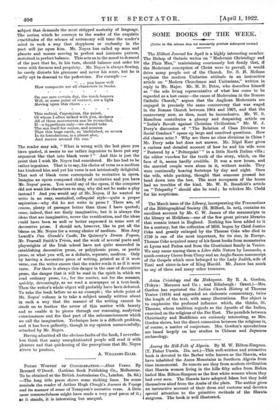SOME BOOKS Or THE WEEK.
iflotice in This column does not necessarily preclude iubsecitiOnt reeksil The Hibbert Journal for April is a highly interesting number. The Bishop of Ontario writes on " Modernist Christology and the Plain Man," maintaining courteously but family that, if the Modernist conception of Christ were to prevail, it would drive many people out of the Church. Dr. S. H. Mellone explains the modern Unitarian attitude in an instructive article on " Modern Churchmen and Unitarians," written in reply to Mr. Major. Mr. M. D. Petry," who describes himself as " the sole living representative of what has come to be regarded as a lost cause—the cause of Modernism in the Roman Catholic Church," argues that the Anglican Modernists are engaged in precisely the same controversy that was waged in the Roman Church between 1904 and 1907, and that the controversy now, as then, must be inconclusive. Mr. W. S. Hamilton contributes a gloomy and despairing article on " India's Revolt against Christian Civilization." Mr. W. J. Perry's discussion of " The Relation of Class Divisions to Social Conduct " opens up large and unsolved questions. How did classes arise ? Why are there no class divisions in China ? Mr. Perry asks but does not answer. Mr. Nigel Kerr gives a curious and detailed account of how he and his wife were. " Pestered by a ' Poltergeist' " in a little North Italian villa ; the editor vouches for the truth of the story, which, on the face of it, seems hardly credible. It was a new house, and the married couple were alone in it, without maids. They were continually hearing footsteps by day and night. Once the wife, while packing, thought that someone pressed her head down into the box. The next occupants of the house had no troubles of the kind. Mr. W. R. Bousfield's article on " Telepathy " should also be read ; he rebukes Mr. Clodd for his scepticism.


































 Previous page
Previous page